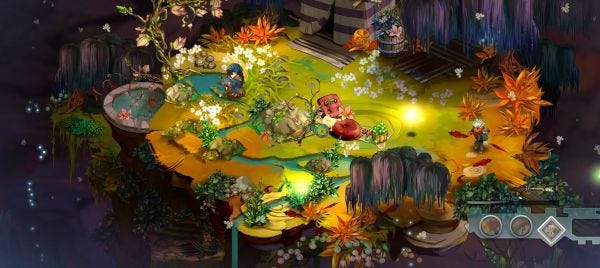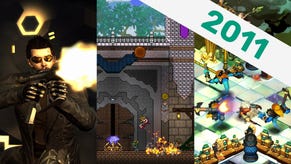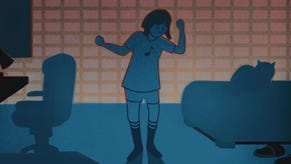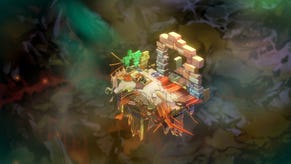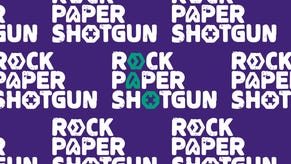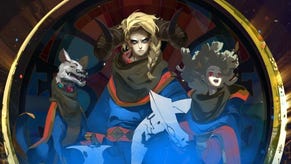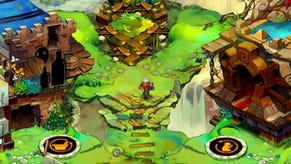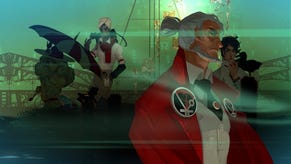Be Heartening: A Bastion Interview
Writing With The Kid
Artful dungeon-crawler Bastion charmed us with its strange world, solid combat mechanics, and elegant narration. John loved it. It even inspired Alec to a big old cleverthink. I decided to have a chat with Greg Kasavin, creative director and writer on the project, to find out a bit more about how Bastion came to be, and what the future holds.
RPS: So I suppose those readers who know your name will know you from way back when you edited Gamespot, but it's been a while since then. How did you eventually become involved in the Bastion project?
Kasavin: I met the co-founders of Supergiant, Amir Rau and Gavin Simon, while we were working together at Electronic Arts. We were all working on the Command & Conquer franchise, specifically Command & Conquer 3 and Red Alert 3. These guys became a couple of my most trusted colleagues over there, and Amir was even one of my room-mates down in Los Angeles, so we had gone through a lot together and ended up quitting in rapid succession in August of 2009. A month later Gavin and Amir had dropped everything to move into a house in San Jose and form SuperGiant Games. They started working on Bastion.
I ended up joining the following year, because I wasn't in a position at the time to make the same kind of sacrifices, so it took some time. I was there for some of the formative discussions, so the game was near and dear to me, even though I wasn't there at the start. When the opportunity presented itself to me to rejoin with these guys it felt clear that I would probably never get another chance like that. And I'm at home with a wife and kid and dogs, it's not the kind of situation in which you drop everything and go and do a startup that might not succeed. But that's what we did and Gavin and Amir knew what my interests were in terms of writing and level design and things of that nature, and they essentially made it so that we are the kind of studio what everyone wants to do, and wants to do well, rather than just what the game needs.

RPS: So tell me a little about the team, it's more than just you three, right?
Kasavin: It's seven people in total. We had some outside help along the way, but core team is the seven of us. Amir is the studio director and served as the lead designer on Bastion. He did about half of the level design in the game, and I did the other half, in addition to the systems tuning and stuff like that. That's in addition to running the studio day to day. Gavin is our gameplay engineer, he made everything work! Derren Korb is our audio director, so he did all the sound and music and recorded all the voice-over. Logan Cunningham is, of course, our voice-actor. He was the voice of the game and I can't imagine a version of Bastion without his voice associated with it. The other two members are Jen Zee, who does our 2D art, and Andrew Wang, who does all our systems-level programming, optimisations, and things like that.
RPS: Regarding Logan - presumably there was a point where his amazing voiceover hadn't been tied into the game. When did that leap arrive?
Kasavin: The narration, the first attempts at that narration, were in January last year. It wasn't contemplated from the beginning of the project, but it quickly became a pervasive part of the game. Late last year Logan got really busy working with us. We recorded a lot of stuff between August and the end of the project, trying to get all the situations in.
RPS: So when did you realise the narration was going to be so integral, though? I can see how you figured it being a part of the game, but it's so fundamental...
Kasavin: That was not long after the first prototype. That was at a point when the game had no graphics, the visuals consisted of scans of monsters from the D&D Monster Manual and like grey stick figures...
RPS: That sounds awesome!
Kasavin: Haha, well, it was pretty embarrassing to look at for anyone who doesn't understand the early stages of game development, and embarrassing even then! But it was so lo-fidelity at that point, just trying to get the controls right and things like that, that getting this voice in there and seeing the dramatic impact that this had, well, it was very promising. What we discovered was that it solved some of the problems that we were struggling with when we thought about the kind of experience we wanted to make. We wanted to have something that had narrative depth to it, something that stuck with players after they stopped playing. It had to be more than the moment-to-moment play experience, and feel deeper than that. But then we didn't want to interrupt the player with conventional story-telling - we didn't want the player to have to stop and pick from a series of list options, or anything like that. That can be very jarring, or it can be done really well, such as in The Witcher 2. We knew we had to do it differently, and the narration allowed it to be key for us, because it kept with the player's own pace, and never pulled them out of the flow of the game.

RPS: The narration definitely defines how players react to the game. It's a very simple trick, too. Almost too obvious. Did it seem obvious? Or did it come with problems?
Kasavin: The execution at the base level is very simple, frankly. The challenge comes from content creation, from anticipating all the different things that a player could do, and to feedback on that in a sensible ways. We played around with the technique quite a bit, but we didn't want the narrator to break certain rules. We didn't want him to break the fourth wall, or to nudge and wink at the player too much. He needed to be telling a story, not just being like a sports commentator. The other issue is tuning everything to feel right. The timing is so important because if it's slightly off it becomes unnatural and awkward. So we spent a lot of time, particularly toward the end of the project, just finessing it. We made sure that the narrator was keeping up with you in an appropriate-sounding way. It requires a lot of iteration, a lot of playing over and over. Feeding back on what the player is doing is important, but also not repeating your gags. Right at the beginning of the game there's the "falls to his death" joke, which is a pretty important moment for us, because players are delighted in that moment. But we never repeat it, and players can go through the game without ever experiencing it. And that's okay, because there are other things they will experience later which will make the story personal to them.
RPS: It must be heartening to have such a positive critical response to the game. How did the team react to that?
Kasavin: It was very heartening on the whole. Before we announced the game we didn't assume it was a game that everyone was going to like. We felt that what we were doing, particularly on the story-telling side, wouldn't be everyone's cup of tea, so to speak. One of the things that felt very refreshing about leaving EA to go work at a smaller studio was not having so much pressure. The "you must sell 3 million copies to break even" and all that sort of stuff was gone. We could make something for a smaller audience. We could make something that those people really enjoy. Getting a generally strong consensus among critics was great, and seeing more thoughtful essays and editorials, even from people who might not have liked it as much as others, or those who had critical things to say, it got them thinking. I happen to appreciate that very much, because that was one of the things we were intending. Foremost we wanted to make something that people would simply enjoy playing through, but we wanted to make something substantive as well.
RPS: So you anticipated, say, people speculating on the relationship between Rucks and the kid? Were you aiming for people to think about what was really going on?
Kasavin: What I'd like to say is that I don't know where the conversations about the game are going to go, but I did plant the seeds for them. I did anticipate some of that - the narration between the kid and the narrator is something that we worked to make intriguing. I was the story writer and it was very important to me that the story feel complete at its ending, and that it have a sense of richness in the characters, in a way that meant you could think about them after you finished playing. And that means not explain or detailing every little thing, because then there's nothing to talk about, nothing to think about. I think there's a fine balance that needs to be found there with stories.
RPS: Did you find yourself fighting the impulse to put in more exposition?
Kasavin: Actually I think the story represents my entire philosophy toward story-telling in a way, my attitude towards exposition has been to make up the bread-crumb trail, rather than to load information up front. It's better to have the player intrigued and half-starved for answers than to bombard them with information that they are probably not going to process because he doesn't even care! Our process is to give the player information at the moment where it matters to the player to know. They see something dangerous and we can talk about it right there. Doing that consistently and properly throughout the whole thing is challenging, of course, but I think the narration made it possible. The kind of response we got from the beginning of the game was fantastic. People would finish our little prologue and say "I want to know what happens". That's music to my ears. I want people to say "I want to know what happens next," for the entire game, and then at the end say "that was an awesome ending." If they do that, then they did a good job.

RPS: Ha, well I haven't finished it yet, I must confess. Too many distractions, as ever. Moving on: are you talking about how well the game has done for you? Can you talk about how it has done on PC vs console?
Kasavin: It's done really well overall. We're happy. We're moving into a new office this week, which was made possible by how it's done. Our real goal with it from a sales perspective was to be able to keep making games on our own terms, without taking publisher money if we can help it, and it's looking like we will be able to do that. As for the sales between console and PC, it's pretty close. We've had a really good experience on Steam, and it's really good to be able to have a direct contact with the people playing your game, as we do through the Steam forums. We don't even have like a main message board, because we're not a publisher with multiple games or anything. The Steam forum has become a de facto community area, and that's really cool. We've been able to update the game with suggested features from there, and that's only possible on PC, really.
RPS: You don't seem to have an plans to make more from the game via DLC, which is actually a bit unusual now...
Kasavin: I can quite safely say we don't intend to sell expansions or anything like that. We aimed to make Bastion feel complete. We aimed to make players not feel a want for direct continuations. If we do anything we will make it free, rather than just try and get a few extra dollars out of people. Hopefully people will continue to talk about the game for a while, and we can continue to support it, and it will be important to us no matter what we do next. We have no plans for Mac or Linux, but we haven't ruled anything out, either. We're looking at options.
RPS: When did you start talking about what you are going to do next, as a studio?
Kasavin: We are talking about it now, but we tried not to talk about it prematurely, because our fate as a studio hinged entirely on this game. We were all very focused on this game until it was done. It seemed arrogant to think ahead of that, if we didn't do everything possible to make it as good as possible. Now that it's done well and things have settled, we are talking about what's next. I don't have anything concrete to say about that, but I would say that I think Bastion represents a lot of our values as game players and game makers, and I think these aspects, like the tight and responsive moment-to-moment experience, and the delivery of narrative in an interesting way, these are what we will want to continue over to anything else we do.
RPS: One other thing I wanted to ask - were you surprised by how popular the soundtrack has been as an independent thing?
Kasavin: Yes, we were, completely. I think we released it in August, and it's number three on Bandcamp right now, but it has been number one for a long time. I don't think we could have anticipated that. The music was, however, a very important element of the game during development, and we took full advantage of having a guy like Derren on the project early on. We used music to find the tone and atmosphere of the game, and the music guided the presentation in a lot of ways. Based on that we thought it would be popular, but the response to it was really cool, and far more than we anticipated. We got to extend the game via bonus tracks on there, and that extends the fiction, giving fans a little bit more.

RPS: No interview with an independent studio is really complete unless we talk a little bit about the current state of the independent scene. We do seem to be entering a new, mature phase of it now, with a bunch of studios in that first couple of years of the "indie boom" now working on sequels - it was marked at GDC this year that many of the indies were wealthier and more relaxed - what's your take on that? How does it feel to you guys?
Kasavin: Well to me it feels great. As a studio, as people, we pushed ourselves harder than we've ever pushed ourselves before, and we wanted to do that to create a particular environment - the kind of environment where people could do their best work. We wanted to make it easy to spend most of your time work, rather than communicating or whatever, and that part feels really good. We got into this when "indie" as a thing was already well established, we were working at EA playing Braid and Castle Crashers, and that was really inspiring. These games are better executed than games by much larger teams, in many cases. That gave us the feeling we could do it. I think we are following in a tradition that has already started, and the result of that tradition is some really good games. Gamers are the real winners of course! But from the perspective of those people starting these studios, it's very hard. They risk everything. It's passion-driven, with people doing unreasonable things for the pupose of what they love.
You know, on other hand, I feel it's never been easier to do this. All the tools, all the new distribution methods. You don't need millions of dollars, and that's really important.
RPS: And that risk and passion is being rewarded. That's the most exciting thing about this stuff - people can now go and make more games like that, take more risks. Jon Blow being so successful with Braid that he thinks he'll just got and make a PC-only first person puzzle game...
Kasavin: Yes, it's a genuinely gratifying feeling to see one of these games do well. In our own case we were relatively highly anticipated, but it wasn't always this game that people were excited about. In the early times it was a very crude prototype with us working out of a house. People were saying "guys, what are you doing?" And we couldn't have made this at a big publisher... from that perspective, well, proving that these things can be successful even though they are not a military-themed shooter, that's really great.
It's in the disposition of people who do this to want to repeat the process - not to make a similar game, but to repeat the steps that made the game happen, which for us was a very exploratory way of making games. We're even more excited about the future now, because our method works. It's been validated. That's exciting.
RPS: Thanks for your time.
